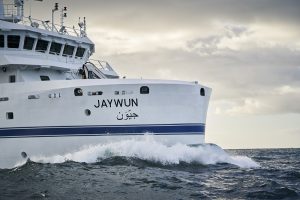ABU DHABI / WAM
The Environment Agency – Abu Dhabi (EAD) and Khalifa University of Science and Technology announced that a team of scientists and marine researchers were on board the region’s most advanced marine research vessel Jaywun, leading the first comprehensive modern sediment survey off the coast of Abu Dhabi.
The mission aims to explore the effects of climate change on the Arabian Gulf’s distinctive marine ecosystem and pave the way for future research opportunities. Launched by HH Sheikh Hamdan bin Zayed Al Nahyan, Ruler’s Representative in Al Dhafra Region and Chairman of EAD’s Board of Directors, the UAE’s first research vessel Jaywun is equipped with advanced technology and six laboratories to support scientific exploration initiatives in environmental preservation and climate change mitigation.
The project was initially launched as part of the expedition under the multilateral memorandum of understanding between the EAD, OceanX, Bayanat, and M42, aboard the Ocean Explorer across the UAE in December 2023.
The study aims to uncover critical insights into marine ecosystems. Through mapping of the seafloor, it will also shed light on underwater features of the Arabian Gulf along Abu Dhabi’s Coast. Future missions on Jaywun, including an extended study off the coast of Fujairah, will continue to build on these findings. The survey’s primary objective is to explore the waters of the UAE and establish a baseline of sediment data from offshore Abu Dhabi for the first time.
Prof Bayan Sharif, Provost of Khalifa University, said, “We are proud to be one of the members of the Abu Dhabi Environmental Research Network (ADERN), launched by EAD.As part of ADERN, the Jaywun research vessel is available to UAE scientists, including our faculty members, who can submit research projects to the EAD for execution on the vessel.”
He added that conducting this first modern sediment survey in offshore Abu Dhabi provides crucial information on climate change in marine ecosystems and enhances the monitoring of marine life safety in the Arabian Gulf.
Ahmed Al Hashmi, Executive Director of the Terrestrial and Marine Biodiversity Sector at EAD, said, “Jaywun enables us to conduct in-depth research on marine ecosystems using sophisticated equipment, ensuring high-quality data collection and analysis. Currently, in partnership with Khalifa University, we are studying marine sediments for the first time to assess the impact of climate change on the Arabian Gulf.”
He added that the results from this research will play a key role in informing future sustainability and conservation projects to protect vital marine ecosystems.
This will enable the researchers on board Jaywun to gain crucial insights into historical and recent changes in the marine environment.
The research also covers sediment movement, the impact of storm events, as well as the overall health of oceanic ecosystems. Moreover, the marine chemistry and sediments formed under these extreme conditions provide insights into a future warmer climate.
 The Gulf Time Newspaper One of the finest business newspapers in the UAE brought to you by our professional writers and editors.
The Gulf Time Newspaper One of the finest business newspapers in the UAE brought to you by our professional writers and editors.
